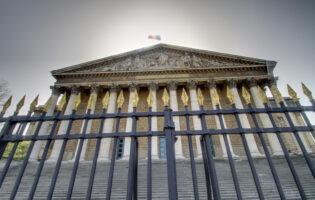Risky Business
A delegation of business leaders, led by German economics minister Sigmar Gabriel, visited Iran in July, just weeks after the U.S. and Iran reached a nuclear deal. Although some are skeptical of the deal and Iran’s desire to fully cooperate, several German corporations see the thaw in relations—and subsequent visit—as a reason for optimism from a business perspective.
The CEO of German chemical giant BASF stated “German technology, German quality work, and German reliability are very highly regarded and so we see good chances to tie again into the old developments.” This statement is echoed by the likes of Siemens and other well-known German corporations. Are they anticipating profitability without considering the long-term economic and political consequences? Given Iran’s track record with international agreements, the reward may be high, but the risk may be even greater.
It is easy to see why the removal of these sanctions on paper makes Iran, considered one of the more economically advanced countries in the Middle East, such an attractive market. For decades, Iran’s economy was an untapped treasure box. But due to political and economic differences, it has been for the most part considered a risky, uncharted market by European firms. Despite the risks, German firms have kept their historical ties with Iran, such that Germany has been the leading European trade partner of Iran, with trade volume hovering around €5 billion over the last decade. Bilateral commerce saw an increase of 42.8 percent between January and May of 2014. With the removal of sanctions, it is projected that trade will almost certainly rise dramatically in the coming months and years.
German firms are attracted by the diversity of Iran’s economy. Not only is Iran one of the largest oil producers, it also manufactures petrochemicals, metals, and automobiles. Combining the opportunity to invest in a variety of different industries with Germany’s excellence in several industries suggests a high potential for benefit. Additionally, Iran is attracted by German firms that have maintained relations during the “sanction regime,” which is beneficial to firms like BASF moving forward in the future. Finally, when talking about Iran, it is hard not to talk about oil and gas production, given that Iran has the fourth-largest oil reserves and the world’s second-largest proven gas reserves. The numerous sanctions over the years have hindered Iran’s ability to produce and sell crude oil as well as other petroleum products. Iran is in dire need of modernizing its oil industry, which could open up a big market opportunity for Germany machinery manufacturers and construction companies.
Regardless of destination countries, investment is always associated with potential risks. Can the government of Hassan Rouhani be trusted to keep their promises on economic policy? Iran is considered riskier partly due to the political complexity of the country. Investors want to be educated on both the economic environment and the political environment in Iran, since they are so frequently intertwined. Iran’s president and parliament are often overridden by its Supreme Leader, who has the final say on the country’s affairs. This confusing power distribution has led to complexity and struggle within Iran’s economy since the revolution in 1979. According to the World Bank’s ranking of ease of doing business, Iran is ranked 130 out of 189 nations. Corruption is rampant, as the revolutionary guards control many industries. It also happens that their leader (the Grand Supreme Leader) has always opposed opening ties to the West, which is a serious red flag that investors must acknowledge.
Another source of concern is Iran’s banking system. The backbone for a country’s economy and a guardian of stability, the banking system in Iran has many structural issues and is not up to international standards. Moreover, volatile exchange rates in Iran dissuade potential investors. Since the 1970s Iran has had at least two exchange rate systems: an official rate provided by the central bank and a flexible exchange rate. With the flexible exchange rate typically used for foreign currency exchange in the Iranian market, foreign investors lack the ability to hedge against aggressive currency fluctuation, which introduces more risks and uncertainties in business operations.
Iran’s legal system poses daunting challenges in international investment law and arbitration. Unattractive laws for investment are discouraging to foreign investors as evident by Article 81 and 139 of the Iranian Constitution. Article 81 does not grant concession to foreign companies in several industries, forcing these companies to establish subsidiaries. Article 139 focuses on arbitration, and it is drafted in a way that favors the Iranian side of the dispute. Foreign investors prefer arbitrators because of their reluctance and skepticism with Iranian courts. If arbitration is pursued, the Iranian government is subject to this treaty only if it decides to refer to it. Arbitration can be denied due to constitutional restraints by the government, which should be worrisome to companies on the basis of lack of protection. Complications also arise because Iran is not a member of the International Centre for Settlement of Investment Disputes (ICISD), the Multilateral Investment Guarantee Agency (MIGA), or the World Trade Organization (WTO). Iran has the ability to involve its internal law and constitution to refuse arbitration jurisdiction even if it has expressed consent to arbitration. This highlights the complexity and obstacles in Iran’s legal system, which investors should keep in mind because if needed, Iran will be able to use these laws to make sure the outcome is in its favor regardless of who is right.
There is cautious optimism as a result of the monumental achievement made between the U.S. and Iran. It opens business doors through the potential for foreign investment—which Iran desperately needs with an ageing infrastructure and outdated practices. German companies can fill that void by investing in the diverse Iranian economy, updating the infrastructure while profiting from an untapped economy. But the conclusion isn’t that straightforward, as shown by the analysis. From reiterated hostile rhetoric toward the West, to a disfavoring legal environment for investors, it creates a scenario that German companies must seriously consider over the potential for profits. Iran must address these worrying factors and demonstrate a positive change in that direction if it really wants to open up its doors to foreign investors, which at the end of the day will not only benefit the country, but remove it from economic isolation.










